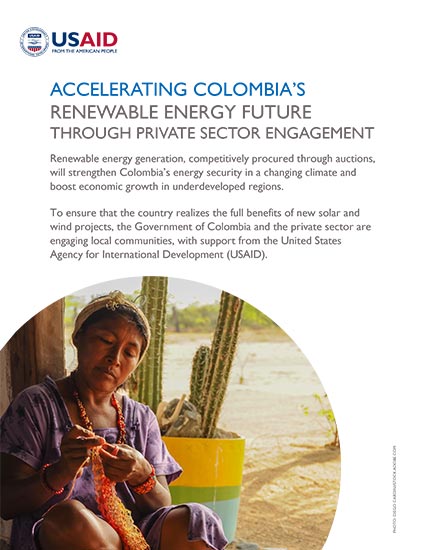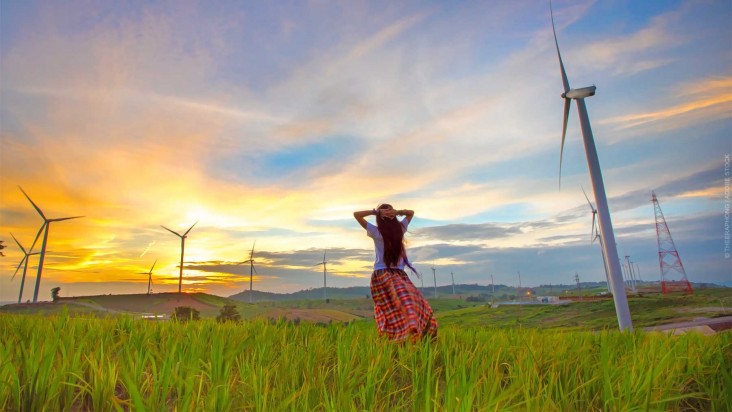-
UPME
Reverse Energy Auction Design Support
USAID is helping Colombia develop policy, regulatory, and business environments to procure renewable energy through auctions. The auction represents an opportunity to bring low-cost renewable energy, while promoting investment in Colombia’s energy sector. Visit the website
After awarding nine power purchase agreements, Colombia incorporates a private sector engagement strategy to ensure renewable energy projects are completed.
Today, many developing countries are creating policy, legal, and regulatory frameworks to attract private investment in clean energy, increase energy efficiency, and expand electricity access. USAID works in partner countries across all aspects of the energy sector to support their journey to self-reliance.
USAID and the Colombia Ministry of Mines and Energy Partner on Auctions
The Government of Colombia held its second renewable energy auction and awarded power purchase agreements to nine solar and wind projects on October 22, 2019, with a total capacity of 1,374 MW. Procuring energy using a competitive, transparent process increases Colombia’s energy resiliency and the sector’s ability to reliably meet electricity demand by incorporating more clean energy into the generation mix. In addition, all Colombians will enjoy the benefits of reduced greenhouse gas emissions and more affordable energy.
After this historic achievement, the Government of Colombia’s Ministry of Mines and Energy (MME) strategically decided to incorporate private sector engagement to ensure project completion. Across Latin America and globally, power projects have experienced delays, cost overruns, and sometimes cancellations due to insufficient engagement with the private sector, communities, and other stakeholders. Communities often perceive that the benefits of the power infrastructure do not reach the local population, and those most affected are not involved in the process, which can result in resistance to projects and unrest.
Led by the Office of the Vice President, the Government of Colombia set out to develop a comprehensive and multi-sector initiative to address a number of issues in Guajira, the state where the majority of awarded projects would be located. While Guajira is rich in some natural resources, it is a desert region and one of the most impoverished parts of Colombia.
As part of this initiative, USAID is supporting the MME, labor ministry, and other stakeholders in the development of a workforce plan that would construct and operate an expected first wave of about 2,531 MW of renewable energy between 2020, consolidate a development engine for the region, and catalyze long-lasting economic benefits for the local population.
Happy woman relaxing with wind generators turbines beautiful sunset background in Khao Kho mountain, Petchabun, Thailand.
© theeraphong / Adobe Stock
Renewable energy auctions have emerged as the best practice for procuring least-cost energy. This competitive, transparent process helps countries meet their energy goals and attract private investment on their journey to self-reliance.
In today’s rapidly evolving renewable energy marketplace, it can be challenging to keep track of current best practices in renewable energy policy, innovations, and market trends. USAID developed the Renewable Energy Auction Toolkit to help international development professionals, energy ministries, utilities, policymakers, and regulators to design and successfully implement energy auctions that expand access to affordable and sustainable clean energy.
The proliferation of renewable energy resources requires comprehensive changes to power infrastructure, market design and business models. USAID, through its Scaling Up Renewable Energy (SURE) project, helps partner countries plan, procure, and integrate renewable energy. USAID’s efforts enhance global energy security; promote private sector investment through transparent, competitive procurement; and open paths to self-reliance by empowering partner countries to control their own economic and social development.



Comment
Make a general inquiry or suggest an improvement.